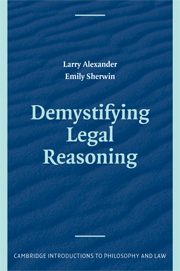Book contents
- Frontmatter
- Contents
- Introduction
- PART ONE Law and Its Function
- PART TWO Common-Law Reasoning: Deciding Cases When Prior Judicial Decisions Determine the Law
- PART THREE Reasoning from Canonical Legal Texts
- V Interpreting Statutes and Other Posited Rules
- VI Infelicities of the Intended Meaning of Canonical Texts and Norms Constraining Interpretation
- VII Nonintentionalist Interpretation
- VIII Is Constitutional Interpretation Different? Why It Isn't and Is
- Epilogue: All or Nothing
- Selected Bibliography
- Index
- References
V - Interpreting Statutes and Other Posited Rules
Published online by Cambridge University Press: 05 June 2012
- Frontmatter
- Contents
- Introduction
- PART ONE Law and Its Function
- PART TWO Common-Law Reasoning: Deciding Cases When Prior Judicial Decisions Determine the Law
- PART THREE Reasoning from Canonical Legal Texts
- V Interpreting Statutes and Other Posited Rules
- VI Infelicities of the Intended Meaning of Canonical Texts and Norms Constraining Interpretation
- VII Nonintentionalist Interpretation
- VIII Is Constitutional Interpretation Different? Why It Isn't and Is
- Epilogue: All or Nothing
- Selected Bibliography
- Index
- References
Summary
What kind of “reasoning” or methodology is employed when judges, lawyers, administrators, and ordinary citizens interpret statutes or other humanly authored and promulgated (posited) laws? Is the interpretation of laws a special form of reasoning, a methodology learned only in law schools?
The reader will not be surprised that we do not regard legal interpretation as some special technique that imbues the notion of legal reasoning with a mystique. Our view is the commonsense, person-on-the-street view: posited laws are nothing more or less than communications from lawmakers to others regarding what the lawmakers have determined the others should do. If, for example, the legislature passes a statute that states, “No property owner shall keep a bear within one thousand feet of a private residence,” the statute represents the legislature's determination of what property owners should do regarding any bears they might possess and probably what sheriffs, judges, and others should or may do if property owners do not act accordingly.
Our starting point, therefore, is that, aside from the irrelevancy that it makes a demand rather than a request, such a statute is fundamentally no different from a letter written by Mom requesting that you put out the dog the next time she comes to visit, or a note signed by your two kids asking you to rent a movie on your way home. The statute, Mom's letter, and the kids' note all refer to some behavior that is either demanded or requested.
- Type
- Chapter
- Information
- Demystifying Legal Reasoning , pp. 131 - 166Publisher: Cambridge University PressPrint publication year: 2008
References
- 1
- Cited by

